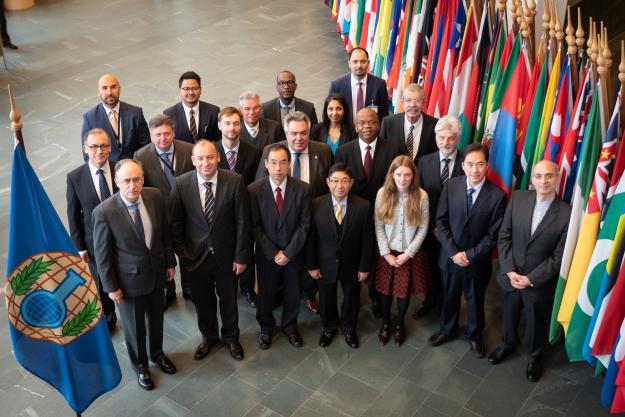
THE HAGUE, Netherlands — 3 May 2019 —The Commission for the Settlement of Disputes Related to Confidentiality–the Confidentiality Commission—elected a new Chairperson during its annual meeting held from 1 to 3 May at the Organisation for the Prohibition of Chemical Weapons (OPCW) Headquarters in The Hague.
Mr Jorge Hagime Shimizu Matsumoto from Mexico was elected to serve for a one-year term as the new Chair. The Commission also elected Vice-Chairs: Mr Amine Sid from Algeria; Prof. Masahiko Asada from Japan; Mr Štěpán Kochánek from the Czech Republic; and Prof. Christoph Vedder from Germany.
The Confidentiality Commission’s 21st annual meeting was opened by the OPCW’s Director-General, H.E. Mr Fernando Arias, who stressed in his remarks that the OPCW Technical Secretariat places great priority on the integrity of the confidentiality regime and on ensuring the support and cooperation of our 193 States Parties.
The Director-General further stated: “Our confidentiality-related procedures assure State Parties that the information they provide is fully protected at all times, in line with the Chemical Weapons Convention.”.
The OPCW Director-General underlined in his speech that with the Commission’s extensive collective legal, diplomatic and disarmament experience, if called upon, it is well-equipped to fulfil its responsibilities.
The Commission further reviewed its procedures and conducted a simulated exercise as part of its standard activities to ensure preparedness for dispute settlement.
Background
The Commission for the Settlement of Disputes Related to Confidentiality is a subsidiary organ of the Conference of States Parties (CSP) to the Chemical Weapons Convention (CWC). The Confidentiality Commission is authorised to consider disputes relating to breaches of confidentiality involving State Parties and the OPCW.
The Commission has 20 members who are appointed by the CSP for a term of two years and are proposed by OPCW’s five regional groups: Africa, Asia, Eastern Europe, Latin America and the Caribbean, Western European and Other States.
As the implementing body for the Chemical Weapons Convention, the OPCW, with its 193 Member States, oversees the global endeavour to permanently eliminate chemical weapons. Since the Convention’s entry into force in 1997, it is the most successful disarmament treaty eliminating an entire class of weapons of mass destruction.
Ninety-seven percent of all chemical weapon stockpiles declared by possessor States have been destroyed under OPCW verification. For its extensive efforts in eliminating chemical weapons, the OPCW received the 2013 Nobel Peace Prize.
